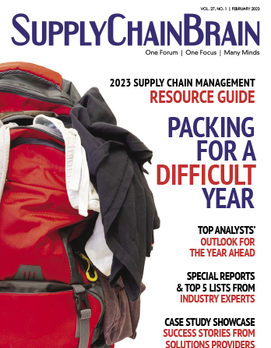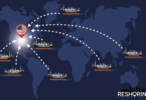
Home » A 3PL Sheds Manual Processes to Streamline Communications With UPS Drivers
CASE STUDY
A 3PL Sheds Manual Processes to Streamline Communications With UPS Drivers

August 1, 2022
Given the surge in consumer demand over the past year, and the resulting pressure on carriers to deliver product in a timely manner, one might be excused for thinking that the old notion of a “peak season” is defunct.
What does “peak” mean when congested ports, a severe shortage of trucks and overflowing warehouses become the status quo? For a big third-party logistics provider like Coyote Logistics, there’s no let-up.
Coyote is doubly challenged to live up to customer expectations because of its commercial relationship with United Parcel Service, one of the dominant players on the front line of the e-commerce boom. It provides UPS with real-time communications and shipment visibility, by interacting directly with UPS drivers and employees as well as physically staffing most of the parcel giant’s nationwide hubs. “That’s a lot of e-mail communication, and a ton of organization,” says Emily Lockhart, Coyote’s strategic planning manager. Business has exploded over the past year and a half, she adds, due to a massive increase in the number of people shopping from home during the COVID-19 pandemic.
The volume of activity grew to such an extent that Coyote found itself in need of a more efficient way of tracking and communicating with the army of UPS drivers. “We were doing a lot of manual work and had been looking for I.T. solutions,” Lockhart says. “But we hadn’t found the correct fit.”
If the Shoe Fits
Then, in 2018, “the stars aligned,” in Lockhart’s words. That’s when a former UPS executive suggested Vector, a San Francisco-based provider of software for streamlining communications and achieving transparency into logistics and field service operations. “They were able to provide granular information to us,” she says. “It was a Cinderella shoe that fit.”
Vector chief executive officer Will Chu describes Vector’s offering, which connects distribution centers with trucking companies and drivers to expedite pickup and delivery, as “like building a TSA PreCheck for freight.” For Coyote, the task was especially challenging, given that the 3PL was also dealing with large numbers of non-UPS trucks to meet end-of-year holiday season demand. Such carriers were unfamiliar with UPS facilities and were relying on Coyote to handle driver check-in, dispatch and routing.
At its height, the operation might see a line of up to 50 trucks waiting for trailers. Coyote, says Chu, needed a system for conveying pickup and delivery information to drivers ahead of time, to speed up processing.
Arriving at a designated facility, the driver checks in through the app and clicks on the correct route load. Upon receiving a trailer, they take a photo on their phone. Vector then applies a GPS tag and timestamp, digitizes the trailer number and relays that information to UPS headquarters, so that the parcel carrier knows precisely which trailers are being moved and when. A similar process is carried out for deliveries.
The system “allows Coyote to move more freight with less manual intervention,” says Chu. “Upon checkout, drivers don’t need to wait in line. They just go on their way.”
A Phased Rollout
Coyote first tested Vector’s technology at one location in Southern California back in 2018, Lockhart says. Initial setup took place at a time when volumes were relatively low. An early challenge was getting drivers used to the system, which required the use of smartphones.
“A lot of our drivers were still using flip phones,” recalls Lockhart, calling the situation “a unique hurdle that we had to get a little bit creative with.” Adds Chu: “Getting drivers to adopt a new way of doing things can be tough.” Vector helped out by sending some of its own reps to UPS locations to demonstrate use of the tool. That level of preparation proved essential to rolling out the application to a wider geographic area.
The Vector system offered a natural incentive to drivers, by allowing them to avoid long lines and wait times. For Coyote, “there are huge benefits in not having to answer as many phone calls,” says Lockhart. “Before, we were confirming a ton of data over the phone.” With volumes in 2020 reaching more than 155,000 thousand loads, the savings in time quickly add up.
Coyote subsequently expanded the Vector app to 15 UPS hubs, which customarily require staff of around 175-200 employees in peak periods. During the pandemic, however, “Vector helped us manage peak-season volume with a team of only about 11 people,” Lockhart says.
Coyote is open to making greater use of Vector’s technology in future. Now, Lockhart says, the system is acquiring a more user-friendly driver interface. The 3PL also wants to devise a more formal set of key performance indicators “so that we can see the improvements that Vector’s been giving us.”
Chu envisions being able to help Coyote in supporting additional accounts, including retailers that already rely on Vector’s app. “Together,” he says, “we’re going out to the broader market and partnering for all of Coyote’s other customers.”
Read more: 100 Great Supply Chain Partners of 2022: Weathering the Storm Together
RELATED CONTENT
RELATED VIDEOS
Subscribe to our Daily Newsletter!
Timely, incisive articles delivered directly to your inbox.
Popular Stories

2023 Supply Chain Management Resource Guide: Packing for a Difficult Year
VIEW THE LATEST ISSUECase Studies
-
JLL Finds Perfect Warehouse Location, Leading to $15M Grant for Startup
-
Robots Speed Fulfillment to Help Apparel Company Scale for Growth
-
New Revenue for Cloud-Based TMS that Embeds Orderful’s Modern EDI Platform
-
Convenience Store Client Maximizes Profit and Improves Customer Service
-
A Digitally Native Footwear Brand Finds Rapid Fulfillment



